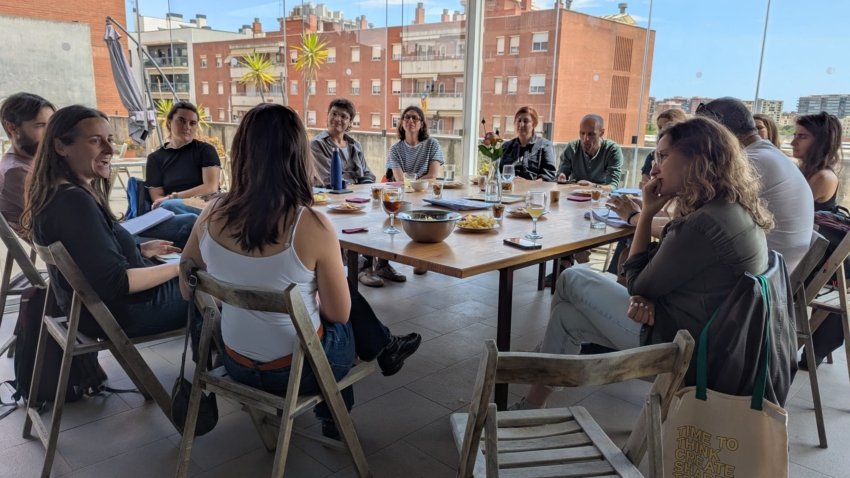
Reflections and thoughts of the Meeting on Sustainability in Artistic Productions
It Monday 12 May We found ourselves in the ship, within the framework of theSketch spaceto collectively reflect on the sustainability in artistic productions. It is a complex debate, with many faces, but we consider it essential to think and project new formulas from the cultural and artistic sectors.
The session began with the presentation of the “Sustainability Guide for Artistic Productions”with the help of her creator, Mireia Giráldez, who served as a starting point for opening a rich dialogue on various topics: the balance between sustainability and eco-sustainability, shared responsibility in this area, and the limits (and tensions) between creative freedom and eco-social commitment. We also questioned whether precariousness can be an excuse not to move towards more sustainable practices and how to find a balance between artistic mobility and environmental awareness.
One of the first reflections, proposed by Mireia Giraldez, was the Limited look we often have about sustainability. Sometimes we lack creativity to address these challenges in an innovative way, and this determines us to repeat poorly transformer patterns.
We also put on the table the fact that, qWe talk about sustainability, we are referring to a broad and transversal concept that appeals to many levels. All, from our plot, we can take small steps, but it must be recognized that we cannot assume everything individually. The key is to become aware of the wide variety of options and scenarios from which sustainability can work.
The conversation also revolved around the Sustainability of human teams and the importance of care. Often, in order to preserve the well -being of people, we must second issues that we consider to be essential, such as environmental sustainability. Recognizing these contradictions is part of the path, but it is important not to be dragged by inertia.
Other topics covered were Productivity in the artistic field and how precariousness can push towards an obvious mercantilizing and capitalist logic of culture. This directly affects sustainability as it hinders the possibility of reusing or “repaying” the resources used in the productions.
The debate was also opened as to whether artists can play an active role in social awareness. Can creative proposals help connect the public with the problem of sustainability and foster collective co -responsibility?
Cultural policies and sustainability
In that sense, the n was raisedIt is a need to involve creators in the political decisions that affect the cultural sector. Giving voice and vote to the “artistic brain” in decision -making spaces can bring a transversal and innovative look, key to facing the climate crisis and reducing the ecological footprint from a cultural perspective.
The underlining the Importance of generating networks and sharing knowledge, As well as creating collective reflection spaces that help grow a more sustainable culture. LInstitutions play a key role in promoting these spaces and facilitating shared resources. Tables of work such as ICEC (C*Plan) already incorporate artists in their operation and the way they project sustainability in the cultural world.
At present, institutions ask artistic companies to comply with Eco-Sustainability indicators and criteria. But how are these criteria a real monitoring? Who decides what is – or is not – sustainable enough?
From the debate table, a Call to the big institutionswhich are the ones that have the most resources, In order for them to be actively involved in these debates, take responsibility and share both the actions they are already taking and the resources they have.. At the same time, cultural theaters and facilities are asked to take responsibility for what is happening in their walls, to alleviate the pressure on the artists and take concrete measures in the field of sustainability.
This was a first meeting to share concerns, demands, hopes and good ideas in relation to sustainability in artistic productions. It is clear that we will continue to talk about it and that there is still a long way to go, but we consider it urgent and necessary for the sector to continue to rethink how this topic works, in a creative and community way, in order to guarantee that we can continue to do our work with respect for the planet and the environment.






